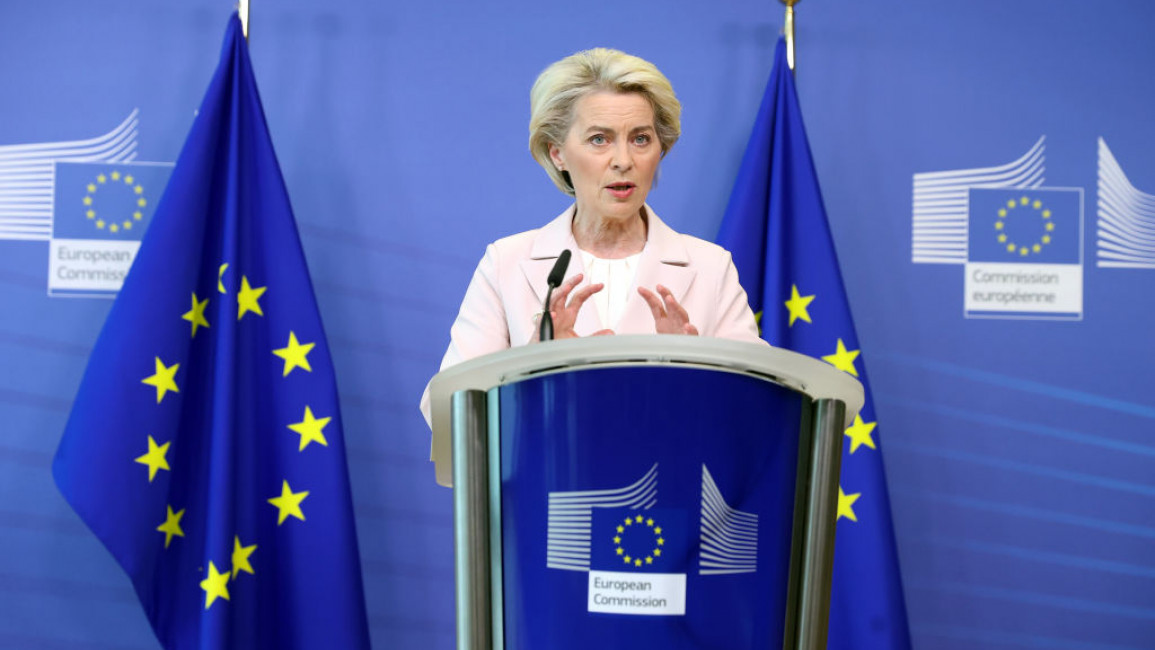Ukraine invasion: EU chief proposes 'orderly' Russian oil import ban
The European Union's chief executive on Wednesday proposed a phased oil embargo on Russia over its invasion of Ukraine, as well as sanctioning Russia's top bank and banning Russian broadcasters from European airwaves.
The plan, if agreed by EU governments, would mark a watershed for the world's largest trading bloc, which is dependent on Russian energy and must find alternative supplies.
But Russia's invasion of Ukraine on February 24, the renewed Russian offensive in eastern Ukraine and the horrific images of slaughter in Ukrainian towns have overcome reluctance to deliver the toughest sanctions so far.
"Today, we will propose to ban all Russian oil from Europe,"
European Commission President Ursula von der Leyen told the European Parliament in Strasbourg.
Finally, we now propose a ban on Russian oil.
— Ursula von der Leyen (@vonderleyen) May 4, 2022
Let´s be clear: it will not be easy.
But we simply have to work on it.
We will make sure that we phase out Russian oil in an orderly fashion.
To maximise pressure on Russia, while minimizing the impact on our economies pic.twitter.com/fH2wuKN5t2
"This will be a complete import ban on all Russia," she said to applause in the chamber.
The Commission's measures include phasing out supplies of Russian crude oil within six months and refined products by the end of 2022, von der Leyen said. She pledged to minimise the impact on European economies.
The price of Brent crude rose 2 percent to $107,11 at around 0900 CET, up 37.5 percent since the start of year.
"We are addressing our dependency on Russian oil. And let's be clear, it will not be easy because some member states are strongly dependent on Russian oil, but we simply have to do it," she said.
"[Russian President Vladimir] Putin must pay a price, a high price, for his brutal aggression," she said.
As well as oil, the latest round of sanctions will hit Sberbank, Russia's top lender, as well as three other banks, adding it to several banks that have already been excluded from the SWIFT messaging system.
"We de-SWIFT Sberbank – by far Russia's largest bank, and two other major banks. By that, we hit banks that are systemically critical to the Russian financial system and Putin's ability to wage destruction," von der Leyen said.
"This will solidify the complete isolation of the Russian financial sector from the global system," she said.
Von der Leyen said more high-ranking Russian military officials would face EU asset freezes and travel bans, without giving names. "You are not getting away with this," she said, referring to the Kremlin.
The proposals by the Commission now need to go to the 27 member states for approval.
Diplomats said there was likely to be a longer period granted to Hungary and Slovakia to stop oil imports as they are so heavily dependent on Russian energy.
Simone Tagliapietra of the Bruegel think tank said the EU's gradual embargo on Russian oil was "a risky bet".
"In the short term it might leave Russian revenues high while implying negative consequences for the EU and global economy in terms of higher prices," he said. "Not to talk about retaliation risks on natural gas supplies."
Many of Russians that The New Arab spoke with fear the worst, and find it difficult to predict where the incursion of Ukraine could go next @redamylou hears from Russian anti-war protesters https://t.co/8oHf8RzAFJ
— The New Arab (@The_NewArab) April 8, 2022
John Lough, Associate Fellow, Russia & Eurasia Programme at Chatham House, said the latest sanctions are likely to have a “significant impact” on Russia’s ability to continue to fund the invasion of Ukraine because of its dependence on the European oil market.
“Further reductions of federal tax revenues on top of an already anticipated 5-10 percent decline in GDP from existing sanctions will have huge consequences for government spending across the board and may generate serious social discontent,” he said.
But he warned: “The oil embargo also carries risks for the EU that the Kremlin will hope it can exploit. A sharp rise in the oil price could mitigate the effects on the economy if Russia is able to divert crude to non-European markets. Equally, high oil prices will bring pain to European consumers and could put pressure on western governments to re-consider their approach to the war in Ukraine.”



